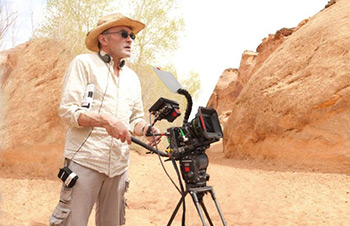
“127 Hours” Round Table Interview October 14, 2010 Elysian Hotel
Backstage Notes: Danny Boyle was really cool to meet in person as he’s a people person who is truly fascinated by life and perceptions. He was interested in my view of his latest film, “127 Hours” and as a journalist I was pleased. The film deals with a hiker in Utah who’s trapped in a canyon and cuts off his arm to survive. My daughter, a recent college graduate from the University of Colorado at Boulder, spent many weekends hiking and camping in Colorado and Utah. The film terrified me and yes, I informed Danny of my concerns.
Sarah Adamson: I’d like to ask you about your film opening in Telluride. My daughter graduated from the University of Colorado at Boulder so I know all about the hiking. I was even familiar with the camel water backpack as I bought her that for hiking trips. I think, as a mom, every parent should see this film!
Danny Boyle: The terrible thing about this film is it confirms what every parent says is true, “always tell people where you are going” (laughs). When you’re a teenager, when you’re a young man you think, “Oh dude, shut up I want to go where I want to go!”
Sarah Adamson: I also think it should be a prerequisite of anyone attending college, especially in Colorado or Utah. (laughs)
Danny Boyle: See, I always found it an exhilarating story. I mean, it is depressing in one sense, but it is exhilarating with all those circumstances. This young man is quite arrogant in the beginning. He thinks he’s perfect. He is brilliantly fit, he can run ultra marathons in the desert, he weighs 160 pounds, is 6 foot 2 inches, prime of life, climbs mountains on his own – 14,000 feet peaks in Colorado and has given up being an engineer at Intel just because he didn’t want to be in a box. And then suddenly, nature just stops it for a moment.
So, I always thought it was an exhilarating story with all of those ingredients. I wanted to tell it in an exhilarating way, really. Nobody was going to watch it if it was a depressing, wilderness movie (laughs). And it’s about all of us as well. The story is often portrayed, especially in America, of course, as a superhero story. He’s a superhuman that somehow manages to cut his own arm off. I don’t think that’s true. I think he’s kind of a superhero when he walks in there – and then nature says, “no, you can’t move this boulder, you think you can do anything, what are you going to do, how are you going to change?” He has to change. He has to realize the people whose affection and emotions he has been too careless with. He has to go on that journey and become one of us again. That’s why the most important line in the whole film is when he sees that Dutch family walking into the distance, he says, “I need help!” And for Aron Ralston to stand up and say, “I need help,” is an amazing end of the journey for him.
Question: Has Slumdog [Millionare] put you in a position…where you are telling the story of an underdog sort of transcending against all odds – are we going to be seeing the “28 Days Later”- type stories at any point? Or, are you going to be telling these kinds of stories? Where are you moving as a storyteller?
Danny Boyle: I’m doing a stage play next, “Frankenstein” for the National Theatre in London, which is really interesting because we have an angle on it that’s slightly different because you can only tell it so many times. Then, I’m doing the opening ceremony of the Olympic Games in 2012 in London so, I’m very proud to do that…
Question: What is your angle on “Frankenstein” that makes it different?
Danny Boyle: It’s from the creature’s point of view, which has never been done. It’s about 200 years old (the story) and its never been done, seriously, from the creatures point of view.
Sarah Adamson: Are you writing the screenplay?
Danny Boyle: No, a friend of mine, we’ve worked together a number of times – because I’ve worked in the theatre before working in movies – we worked together back then as well so we’ve been working on this for a while and we finally got the go ahead.
Sarah Adamson: I love London theatre!
Danny Boyle: Right, it will be interesting! And this will be a bit different as well.
Question: “127 Hours” is an inspirational film and when you get to the gore of it, you know, that moment when he does decide to remove the arm – how do you balance that out when you’re approaching a general audience? When you’re saying, “Hey, I’m going to take you on this inspirational journey” are you afraid you’re going to lose them or does that just intensify…?
Danny Boyle: The studios certainly were. And I can understand them being very nervous about letting this kind of thing go ahead because, obviously, its not something you can change, that’s the advantage of a true story (laughs). You can’t change it but basically, when I read the book, I remember reading the chapter and I thought – we’ve got to do it very accurately like that. You’ve got to reflect the fact that its not instant, in reality it took him over 40 minutes. You have to reflect that somehow. And there’s a very important point in there about our bodies that we live in and that we take for granted.
You can’t just get rid of a bit of it, its not that easy. It involves an extraordinary degree of pain for him. Which, I think, probably women understand from childbirth but I don’t think men really have any vision of what that pain is (unless you’ve been in a terrible accident). It’s also important, and this is why I wanted to do the film, not as a cool film, but as an exhilarating film…I thought the only way you’ll ever tolerate watching it, is if its not done instantly because its not a horror movie where you’re not turning off the gore. It is if you, in some way participate. You sort of want him to do it because he has to do it. It’s the only way he’s going to get out. Every other avenue has been cut off.
It’s difficult to watch, but in some way you have to want him to get through it. And what is astonishing, we did have a few people fainting, early on, but more importantly, (and they were all fine) I don’t remember anyone walking out. This does tell you something about it because normally, with something like this people just go. But I think, people know they’ve got to get through this now, they’ve committed to so much of it.
Question: It transmutes the experience into the most joyous part of the film – when he pulls free! On one hand, you’re like okay he cut his arm off…
Danny Boyle: But when he steps back like that…and the look on Franco’s face is just…when he did that I was just like, “That’s a proper actor!” He’s a proper actor because his real arm, of course, is behind his back, so for James, it’s highly technical (the step back because this is fake) but his eyes are completely convincing.
Sarah Adamson: The problem solving aspect, to me, was so intriguing and interesting. He had exhausted every resource but I think that’s such a crucial part of the film that any of us, as humans, would go through if you were in this situation.
Question: How did you choose Franco for this role? What was it that told you James Franco was the one to do this?
Danny Boyle: We met a bunch of guys. I knew his work, his serious side of his work including, “Milk.” When I saw, “Pineapple Express,” as a director who likes actors, I thought, “Wow, that’s a proper actor.” When you’re a serious actor and you can do a proper comic turn like that you think, “That’s a proper actor!” It’s like DeNiro. DeNiro does the intense stuff and then he does, “The King of Comedy” and its like those are proper actors…film actors. They can turn on a sixpence. I remember thinking, “I’d love to work with him.” When this came up, it wasn’t like he was a look-alike. He wasn’t an obvious choice. He’s quite urban-like, James’ appeal, but when he read it (script)– you could hear that he could do it. So, we cast him!
Journalists: Thank you so much!
Sarah Knight Adamson© October 14, 2010
